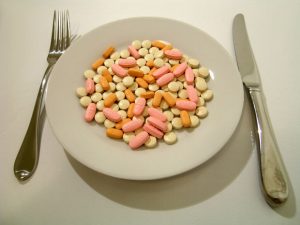Identify Symptoms Of Laxative Abuse
 Laxative abuse is an eating disorder that is often referred to as another type of bulimia.
Laxative abuse is an eating disorder that is often referred to as another type of bulimia.
Laxative bulimia occurs when a person attempts to lose weight or purge food from the body through the frequent and repetitive use of laxatives. Laxative abuse can be particularly dangerous because life-threatening side effects like dehydration and organ damage can accompany the condition.
Meal times
Symptoms of laxative abuse can usually be seen around meal times, when a person will consume pills, powders or liquid-based laxatives to purge food from the body. The individual might carry around lots of unidentified pills or supplements. Like a bulimic, it’s not uncommon for someone suffering from laxative abuse to disappear to a bathroom after meals in order to take laxatives.
Dependence
Laxative abuse can also be identified by the level of dependence a person has on the laxatives. While it can be normal and even healthy to occasionally use laxatives during bouts of constipation, a person abusing laxatives probably believes that he or she cannot have a regular bowel movement without the use of laxatives – and this may actually be true. The long-term use of laxatives can cause physical dependence, making it difficult for the large intestine to naturally expel waste without the help of the stimulating ingredients found in most laxative products.
Physical symptoms
Sometimes people who are abusing laxatives will suffer from physical symptoms like cramping, shaking or tremors. These symptoms are usually due to severe dehydration and electrolyte imbalances. Blood in the stools is also a common symptom of laxative abuse, which is caused by damage to the intestinal tract. Nausea and vomiting may also occur, which is essentially a response to toxic substances – the laxatives – that the body is trying to get rid of.
Because the overuse of laxatives can be extremely dangerous – and sometimes fatal – it’s important to seek immediate medical care if you or someone you know is suffering from laxative abuse. A health professional who has experience treating eating disorders can recommend a course of treatment that will address the emotional, psychological and physical issues associated with the condition.
Source: National Eating Disorders
 Eating Disorder Self Test. Take the EAT-26 self test to see if you might have eating disorder symptoms that might require professional evaluation. All answers are confidential.
Eating Disorder Self Test. Take the EAT-26 self test to see if you might have eating disorder symptoms that might require professional evaluation. All answers are confidential.